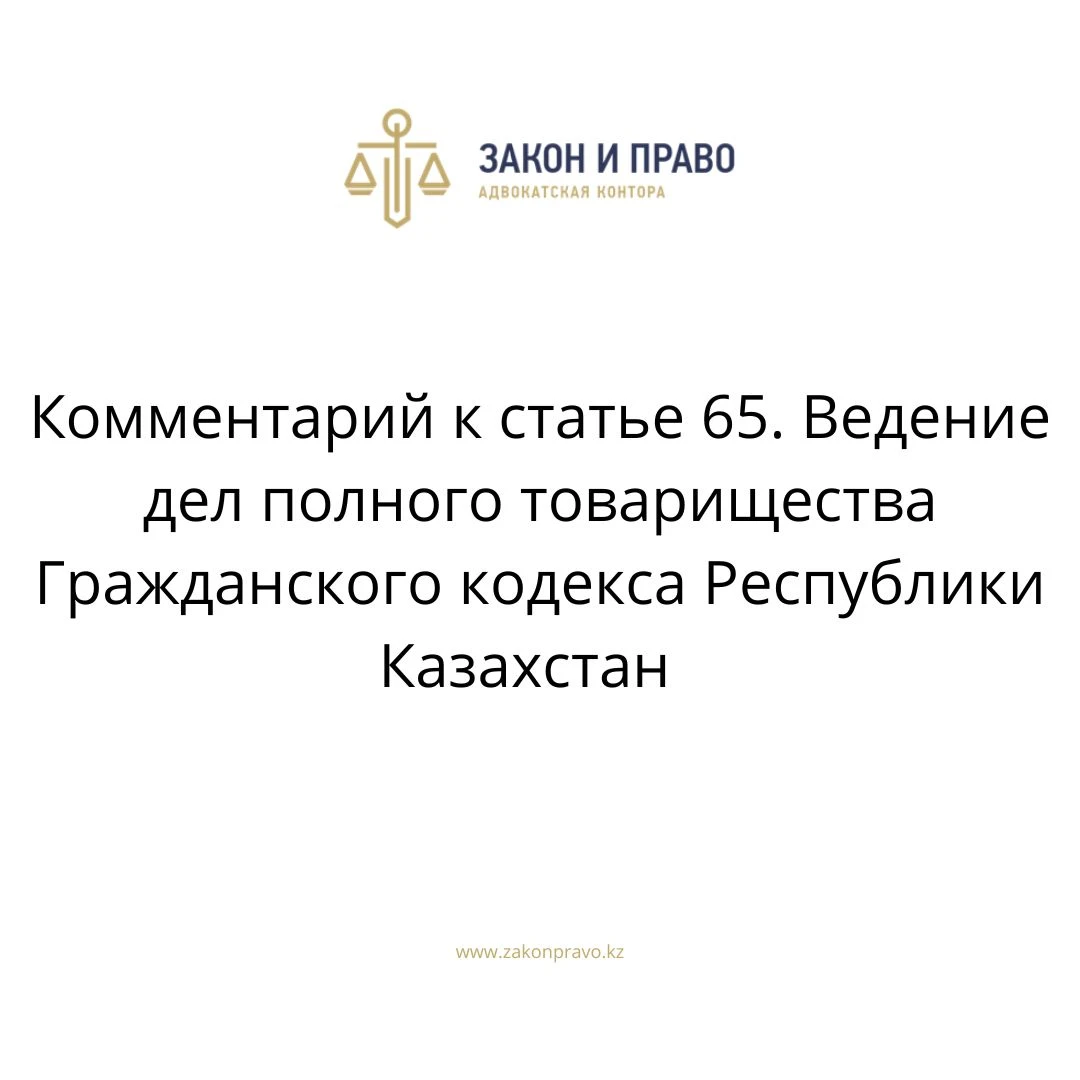Commentary to article 65. Managing the affairs of a full partnership of the Civil Code of the Republic of Kazakhstan
In a general partnership, there is a supreme governing body represented by the general meeting of participants and an executive body that carries out the day-to-day management of the partnership's activities, concludes contracts on its behalf, disposes of property, etc.
In a general meeting, each participant in a general partnership has one vote (and in this respect the nature of a general partnership is closer to a cooperative), unless the founding agreement establishes a different procedure for determining the votes belonging to the participants. Thus, the founding agreement may provide that the participants have the number of votes in proportion to the size of their shares in the authorized capital and in the property of the partnership, as well as any other provision at the discretion of the participants.
The basic rule that each participant has one vote is associated with the emergence of a provision on the unanimity of all participants in resolving internal issues of the general partnership, unless the founding agreement explicitly provides for cases where a decision can be taken by a majority vote. Although the Civil Code does not clearly distinguish between internal and external partnership relations, internal relations should be understood as relations in the conduct of business, decision-making, distribution of profits and participation in covering losses, etc., which are regulated by dispositive norms. External relations should include relations on the representation of the partnership and relations related to liability for the obligations of the partnership to its counterparties, which are defined in the Civil Code, as a rule, imperatively (see art. 63 and paragraphs 2 and 4 of this Article and comments to them).
The right to sign documents on behalf of a legal entity belongs to the first head and some of his deputies, as well as to the chief accountant, if it concerns accounting, banking and other similar documents. All other persons have the right to act on behalf of a legal entity only by proxy. Based on this, the Civil Code provides that the management of a general partnership is carried out by its bodies. The types, procedure of formation and competence of the management bodies of the partnership are determined by the constituent documents on the basis of the provisions of the Civil Code and other legislative acts.
The management of a general partnership is carried out taking into account the requirements of both paragraph 1 of this Article and art. 60 of the Civil Code.
Since the members of a general partnership are jointly and severally liable for the debts of its property if its assets are insufficient, if the activities of one of the participants harm the partnership, it may cause losses to its participants. One of the types of such activity is the creation of competition to the partnership through the implementation of similar activities. To protect the property rights of participants in a general partnership, the Civil Code prohibits participants in this type of partnership from making transactions on their own behalf and in their own interests or in the interests of third parties that are similar to those that constitute the subject of the partnership's activities, unless the consent of the other participants is obtained. In case of violation of this rule, the general partnership has the right, at its discretion, to demand from such a participant either compensation for losses or the transfer of all benefits acquired through such transactions. The last resort, apparently, will be used if it is impossible to prove the amount of damage caused.
In addition to this case, losses to the participants of a general partnership may be caused in other ways, in particular through improper management of the partnership's affairs by its executive body. In order to prevent abuses by the management bodies of the general partnership and its officials, the Civil Code obliges the bodies of the partnership charged with conducting its affairs to provide all participants, upon their request, with complete information about their activities.
Members of a general partnership are deprived of the opportunity to conduct business on its behalf without appropriate authority. However, in some cases, participants may make transactions without having the authority to make them, which will benefit the partnership. If their actions are not approved by all other participants, they have the right to demand compensation from the partnership for the expenses incurred by them, proving that due to their actions the partnership has saved or acquired property exceeding the cost of the expenses incurred by them.
However, this article does not answer the question of whether a transaction concluded by a participant without proper authority is valid. In this case, it is obvious that the rule of Article 165 of the Civil Code on representation without authority will apply.
Constitution Law Code Standard Decree Order Decision Resolution Lawyer Almaty Lawyer Legal service Legal advice Civil Criminal Administrative cases Disputes Defense Arbitration Law Company Kazakhstan Law Firm Court Cases
The commentary was prepared within the framework of the scientific and practical research program of the Scientific Research Center of Private Law of the Kazakh State Law University.
Head of the working group on the preparation of the draft Civil Code of the Republic of Kazakhstan, Corresponding Member of the Academy of Sciences of the Republic of Kazakhstan, Professor Suleimenov M.K.
Deputy head Professor Basin Yu.G.


